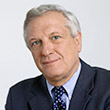 My education at Swarthmore never became obsolete. What I learned here in philosophy, economics, and political science, in psychology, fine arts, and history, was money in the piggy bank of the mind that was never depleted. It was the asset of all assets, which kept multiplying. Because liberal arts, unlike all those "relevant" subjects from management studies to computer science never turns obsolete. Liberal arts is the tool of all tools that will accompany you all your life. Josef Joffe '65
My education at Swarthmore never became obsolete. What I learned here in philosophy, economics, and political science, in psychology, fine arts, and history, was money in the piggy bank of the mind that was never depleted. It was the asset of all assets, which kept multiplying. Because liberal arts, unlike all those "relevant" subjects from management studies to computer science never turns obsolete. Liberal arts is the tool of all tools that will accompany you all your life. Josef Joffe '65
Swarthmore means learning what the experience was about many years afterward, while during the time I was there, I was only able to nibble briefly at the sumptuous banquet presented to me as a student and, as a queer person of color, frustrated sexual being. I learned more than many did, though my grades hardly reflect that, while hardly able to understand how special the experience was, except in retrospect. I am still learning how special that place is, with all of its faults and flaws, beauties and majesties. It is not just a collection of people, landscapes and traditions. Its specialness lies in no one thing, no one person, no one class of people, and no one idea. It is better than it is. And though they were also difficult, I would never give up my times there, because they helped shape who I am. Octavio Gonzalez '97
When I applied to Swarthmore, I ate lunch in the dining hall with several students who'd graduated from my high school. They were so engrossed in a discussion started in their philosophy class that we never talked about the College. No matter. The way my friends talked – intensely, leaning in as if they could communicate more quickly by shortening distances between each other – was enough for me: I wanted to attend Swarthmore. More than 50 years later, I treasure that image of Swarthmore – students, their heads close together, engrossed in intense conversations. My four years were like that. Technological developments, such as the Internet and cell phones, unimaginable to us in 1962 when I graduated, have transformed student life. Yet my many contacts with Swarthmore students and Swarthmore alums since then, on and off campus, confirm that my image of Swarthmore still holds true. Cynthia (Norris) Graae '62
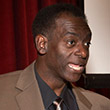 I was at Swarthmore from 1981-1985 and made leaps and bounds towards the man I am today. Swarthmore means so much to me: the family feeling of being a student-athlete and the struggles we shared together on the football field, baseball field, on the track, and in the classroom. We grew together and the bond will never be broken. Being exposed to so many different kinds of people and learning from them was exciting and has never been recreated in my life. I am very comfortable and celebrate the differences of people that I meet. Swarthmore College means I have numerous people out there who understand me in a way that others cannot. All I have to do is mention McCabe Library or Parrish Hall and we are transported back to the good old days. Eddie "The Hammer" Greene '85
I was at Swarthmore from 1981-1985 and made leaps and bounds towards the man I am today. Swarthmore means so much to me: the family feeling of being a student-athlete and the struggles we shared together on the football field, baseball field, on the track, and in the classroom. We grew together and the bond will never be broken. Being exposed to so many different kinds of people and learning from them was exciting and has never been recreated in my life. I am very comfortable and celebrate the differences of people that I meet. Swarthmore College means I have numerous people out there who understand me in a way that others cannot. All I have to do is mention McCabe Library or Parrish Hall and we are transported back to the good old days. Eddie "The Hammer" Greene '85
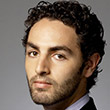 Swarthmore gave me the skills, values, friends, networks, and opportunities to be a social entrepreneur. From discussing the merits of practical wisdom to running down the hill to volunteer on an ambulance, from starting an anti-genocide organization to biking from D.C. to Pittsburgh – all with fellow Swatties – I am eternally grateful for being a part of the Swarthmore community. Mark Hanis '05
Swarthmore gave me the skills, values, friends, networks, and opportunities to be a social entrepreneur. From discussing the merits of practical wisdom to running down the hill to volunteer on an ambulance, from starting an anti-genocide organization to biking from D.C. to Pittsburgh – all with fellow Swatties – I am eternally grateful for being a part of the Swarthmore community. Mark Hanis '05
Swarthmore was my awakening in all important respects, and it has remained my lodestar in those ways personally and professionally ever since graduation. Even more than being my introduction to the life of free and unbounded inquiry, Swarthmore epitomized for me then and thenceforth the joy, depth, and wonder of a community sharing that world. My enduring aspiration has been to recreate as much of that particular ineffable sense of community as possible in my work and in my avocational pursuits. Asked in alumni interviews of prospective Swarthmoreans what about the College has seemed most important to me over the years, I've also cited its egalitarianism and the collaboration rather than competition that has seemed always to infuse all its pursuits, both in much too short supply in what too often passes for community. John Harbeson '60
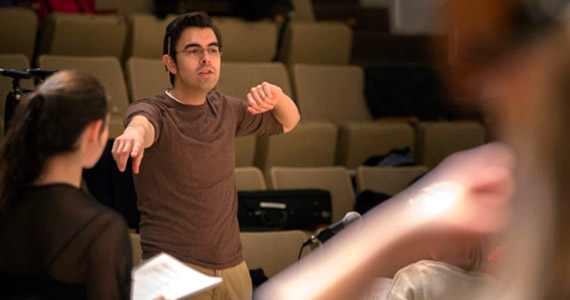
For me, Swarthmore meant freedom to explore and freedom to be myself. The College provided an environment of great natural beauty, enthusiastic guides and supporters, and hundreds of similarly nerdy peers. (By "nerds," I mean people whose inner drive to pursue knowledge is stronger than the pressure to be "cool.") In exchange for this idyllic haven of intellectual safety, we were charged to ask questions, to seek meaning, and to embrace everyone else's questions, too, no matter how quirky or particular. Now, as a teacher, I try to foster this same enthusiasm for learning and questioning in my students. The pressure of society to "fit in" is ever more stifling, but each year Swarthmore finds and encourages hundreds of young seekers who want to deepen their intellectual powers and to use their learning to improve the world around them. Andrew Hauze '04
 The simplest way for me to characterize what I got out of Swarthmore is that it put me on the path to being human. ... What do I mean by being human, in terms of what was so important about the Swarthmore experience, is this extraordinary combination of endowing one with the reasoning skills and this odd mixture of confidence, fear, and humility which allows you to recognize what you don't know, and combining that with an awareness of the world we love in and all the challenges and opportunity. That's something that I found unbelievably valuable. William Boulding '77
The simplest way for me to characterize what I got out of Swarthmore is that it put me on the path to being human. ... What do I mean by being human, in terms of what was so important about the Swarthmore experience, is this extraordinary combination of endowing one with the reasoning skills and this odd mixture of confidence, fear, and humility which allows you to recognize what you don't know, and combining that with an awareness of the world we love in and all the challenges and opportunity. That's something that I found unbelievably valuable. William Boulding '77
How can I be anything but grateful? Swarthmore was humbling, intimidating, and stimulating. I was surrounded by beauty and the smell of lilacs in the spring. And I found friends for life (at last finding my 'tribe'), and met my wonderful husband, Phil, whose intelligence, humor, and love freed the rest of my life for growth and happiness. Pam Corbett Hoffer '66
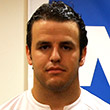 Even though I grew up 15 minutes away from the campus, attending Swarthmore was so special because it opened my eyes to the world. Coming from a small, homogeneous town, it was the first place where I encountered people with life views, theories, and perspectives that were different from my own. The culture shock made for a bittersweet social experience in my time while attending the College (because it felt like pieces of my identity and pride were being challenged constantly), but, in retrospect, it really prepared me to better identify with, listen to, and serve people from different cultures and socioeconomic backgrounds, which has undoubtedly enhanced my personal life and professional life since graduating. I'm frightened at the thought of the narrow-minded, inflexible person that I might have been had I gone to anywhere else but Swarthmore. Andy Hoot '10
Even though I grew up 15 minutes away from the campus, attending Swarthmore was so special because it opened my eyes to the world. Coming from a small, homogeneous town, it was the first place where I encountered people with life views, theories, and perspectives that were different from my own. The culture shock made for a bittersweet social experience in my time while attending the College (because it felt like pieces of my identity and pride were being challenged constantly), but, in retrospect, it really prepared me to better identify with, listen to, and serve people from different cultures and socioeconomic backgrounds, which has undoubtedly enhanced my personal life and professional life since graduating. I'm frightened at the thought of the narrow-minded, inflexible person that I might have been had I gone to anywhere else but Swarthmore. Andy Hoot '10
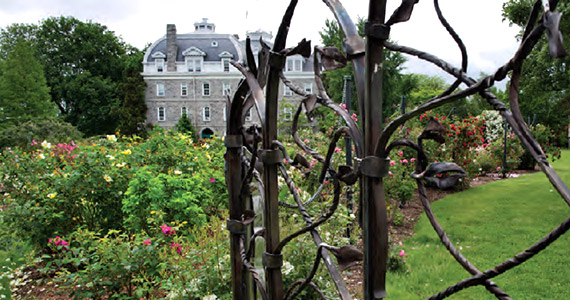
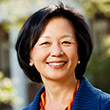 I would not be the person that I am were it not for the years that I spent at Swarthmore. Not only did I learn how to learn, but I understood very deeply how important it is to give back because I was in a position of privilege. So for that I am forever indebted and grateful to Swarthmore. Phyllis Wang Wise '67
I would not be the person that I am were it not for the years that I spent at Swarthmore. Not only did I learn how to learn, but I understood very deeply how important it is to give back because I was in a position of privilege. So for that I am forever indebted and grateful to Swarthmore. Phyllis Wang Wise '67
I've created a list of what Swarthmore meant to me: close friends passionately talking until early in the morning, sitting in the hall of Wharton eating Ramen; respect from all the professors; intellectual challenge that kept me on the edge of my brainpower; musical opportunities like none other (playing solo flute in Brandenburg Concerto #4, playing in a 12-flute ensemble coached by Gilbert and Kalish); amazingly deep seminars in Shakespeare with Susan Snyder; an evening reading of all the Brandenburg Concertos at Professor Gilbert Stott's house followed by Mrs. Stott's home-made breads and cookies; sitting on Parrish Lawn reading; running through the Crum; enjoying the azaleas and rhododendrons in May, torn between being outside and studying for exams; returning for Alumni Day only to discover more people I didn't know, and realizing that *everyone* is interesting!; setting the standard for all my further study. Nowhere else has lived up to that standard (Stanford, Middlebury, Oxford, Harvard, New England Conservatory, USC). Nancy Noble Holland '72
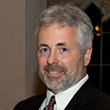 Marilyn Gillespie '49 once told me that Swarthmore graduates act like they share some special secret. Why is that? Is it being challenged by brilliant professors, but also, occasionally, impressing them? Is it being in awe of the talents, achievements, and intellect of your peers and wanting to be more like them? Is it because each member of the community "matters," having ample opportunities to make an impact? Is it the constant striving for "reasonableness," to ask questions, and argue about the meaning of... everything, over long dinners at Sharples or in Willets late into the night? Is it the sense of social justice that permeates? (Or is it meeting my Quaker Matchbox match?!) It was all this and more. Swarthmore inspires me to be a better person and to make a difference in the world. That's a secret worth sharing. Pat Holmes '82
Marilyn Gillespie '49 once told me that Swarthmore graduates act like they share some special secret. Why is that? Is it being challenged by brilliant professors, but also, occasionally, impressing them? Is it being in awe of the talents, achievements, and intellect of your peers and wanting to be more like them? Is it because each member of the community "matters," having ample opportunities to make an impact? Is it the constant striving for "reasonableness," to ask questions, and argue about the meaning of... everything, over long dinners at Sharples or in Willets late into the night? Is it the sense of social justice that permeates? (Or is it meeting my Quaker Matchbox match?!) It was all this and more. Swarthmore inspires me to be a better person and to make a difference in the world. That's a secret worth sharing. Pat Holmes '82
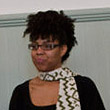 Swarthmore will always remain one of the great experiences of my life. I would say it was pretty important in beginning my development as an independent-thinking young woman – my whole self, my strengths, my weaknesses, how I wanted to approach the world, and overall the type of individual that I wanted to be. It nurtured my critical thought and further supported the development of my critical identity (this is such typical Swattie speech). There were two specific things that I appreciated most about Swarthmore. First, it created a culture that supported individual expression. Second, the emphasis on civic engagement and service allowed me to see the power of numbers and organization when individuals work together for the betterment of humanity. I am very thankful for it. Marsha-Gail Davis '10
Swarthmore will always remain one of the great experiences of my life. I would say it was pretty important in beginning my development as an independent-thinking young woman – my whole self, my strengths, my weaknesses, how I wanted to approach the world, and overall the type of individual that I wanted to be. It nurtured my critical thought and further supported the development of my critical identity (this is such typical Swattie speech). There were two specific things that I appreciated most about Swarthmore. First, it created a culture that supported individual expression. Second, the emphasis on civic engagement and service allowed me to see the power of numbers and organization when individuals work together for the betterment of humanity. I am very thankful for it. Marsha-Gail Davis '10
Swarthmore taught me many valuable life lessons: the value of a liberal arts education; the value of good friends (many of whom are still such today); how to respect other peoples' opinions when they were different from mine; and the importance of giving back to society. What a terrific experience! Eric Jacobs '66
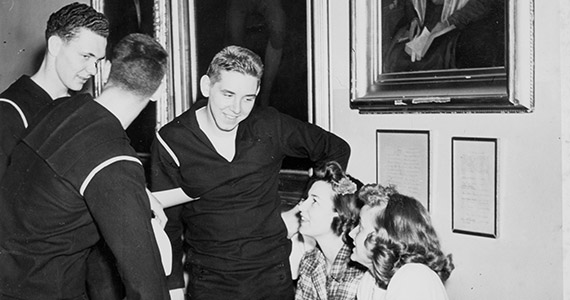
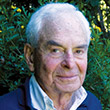 Swarthmore had a profound influence on my life — as it did on many. Just a few months after being on a submarine off the coast of Japan at the end of WWII, I found myself on this idyllic campus, thanks to the GI Bill of Rights that funded college education for returning veterans. I owe so much for what I am — and for what I have been able to do — to the influence of the wonderful professors under whom I studied — and to my fellow students, who came from such diverse backgrounds. Idealism and optimism characterized the post WWII generation at Swarthmore. The quiet Quaker spirit permeating the College community influenced all of us. Herbert Kaiser '49
Swarthmore had a profound influence on my life — as it did on many. Just a few months after being on a submarine off the coast of Japan at the end of WWII, I found myself on this idyllic campus, thanks to the GI Bill of Rights that funded college education for returning veterans. I owe so much for what I am — and for what I have been able to do — to the influence of the wonderful professors under whom I studied — and to my fellow students, who came from such diverse backgrounds. Idealism and optimism characterized the post WWII generation at Swarthmore. The quiet Quaker spirit permeating the College community influenced all of us. Herbert Kaiser '49
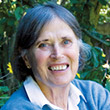 I could say simply that Swarthmore was so special to me because I met Herb, my husband of almost 65 years, on the front porch of Parrish. But there was a lot more than the "Little Quaker Matchbox" in my Swarthmore experience: discovery of new ways of thinking and learning – and not just in the classroom. I think we all learned as much from our peers as from our professors. Friendships that began at Swarthmore have endured to this day. Living in the physical beauty of the Swarthmore campus also had a lasting impact – as I've tried in many gardens of many houses in several countries to create a faint echo (oh, so faint) of Swarthmore's landscape. Joy Sundgaard Kaiser'51
I could say simply that Swarthmore was so special to me because I met Herb, my husband of almost 65 years, on the front porch of Parrish. But there was a lot more than the "Little Quaker Matchbox" in my Swarthmore experience: discovery of new ways of thinking and learning – and not just in the classroom. I think we all learned as much from our peers as from our professors. Friendships that began at Swarthmore have endured to this day. Living in the physical beauty of the Swarthmore campus also had a lasting impact – as I've tried in many gardens of many houses in several countries to create a faint echo (oh, so faint) of Swarthmore's landscape. Joy Sundgaard Kaiser'51
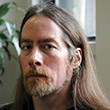 I've come to believe a pretty good gloss on what a liberal arts education, and particularly this college, seeks to produce: people who feel obliged to, and capable of, thinking and acting clearly, independently, effectively, and rightly. David Kennedy '80
I've come to believe a pretty good gloss on what a liberal arts education, and particularly this college, seeks to produce: people who feel obliged to, and capable of, thinking and acting clearly, independently, effectively, and rightly. David Kennedy '80
Swarthmore confirmed my conviction that the most worthy thing you can do with your life is to try to make the world a better place. By doing that, it also confirmed my sense of my worth and my ability to help make that difference – and the worth of seeking and creating. Judy Petsonk '66
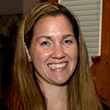 I've done my best when I feel loved and supported and that's what I got here at Swarthmore. Whether it was on the field, on the court, or in the classroom, I definitely felt the caring love and support of everyone here and that's made this school special to me. Heather Kile-Lord '01
I've done my best when I feel loved and supported and that's what I got here at Swarthmore. Whether it was on the field, on the court, or in the classroom, I definitely felt the caring love and support of everyone here and that's made this school special to me. Heather Kile-Lord '01
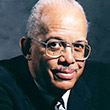 My experience of Swarthmore as a student, even when it hurt, increased my self-confidence, my capacity to understand others, and my ability to forgive. I learned that my humanity is more than my intellect and that my heart and soul are its partners in finding the paths to balance and fullness. I came here believing happiness lies in what you do for others and the experiences then and over the last 25 years affirm and sustain that belief. And a word of tribute and gratitude for the faculty who taught me so much through their disciplines and as models for living: Helen North, Dan Hoffman, Elizabeth Wright, Larry Lafore, Hilde Cohen, and Gil Stott. Maurice Eldridge '61
My experience of Swarthmore as a student, even when it hurt, increased my self-confidence, my capacity to understand others, and my ability to forgive. I learned that my humanity is more than my intellect and that my heart and soul are its partners in finding the paths to balance and fullness. I came here believing happiness lies in what you do for others and the experiences then and over the last 25 years affirm and sustain that belief. And a word of tribute and gratitude for the faculty who taught me so much through their disciplines and as models for living: Helen North, Dan Hoffman, Elizabeth Wright, Larry Lafore, Hilde Cohen, and Gil Stott. Maurice Eldridge '61
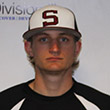 My experience at Swarthmore was defined by the founding of everlasting friendships. Though I had many insightful discussions and learned a great deal, it was my friends who taught me the most. These were my teammates, peers, teachers, coaches, and community members. Because of my time at Swarthmore I now have friends (adopted family!) from every corner of the globe who constantly amaze me with what they are capable of. I am a much better person and only want to improve thanks to these amazing people. At Swarthmore, I was never far from a friend, maybe a five-minute walk. Distances may have changed but the love I have for these amazing people never will. Sean Mangus '13
My experience at Swarthmore was defined by the founding of everlasting friendships. Though I had many insightful discussions and learned a great deal, it was my friends who taught me the most. These were my teammates, peers, teachers, coaches, and community members. Because of my time at Swarthmore I now have friends (adopted family!) from every corner of the globe who constantly amaze me with what they are capable of. I am a much better person and only want to improve thanks to these amazing people. At Swarthmore, I was never far from a friend, maybe a five-minute walk. Distances may have changed but the love I have for these amazing people never will. Sean Mangus '13
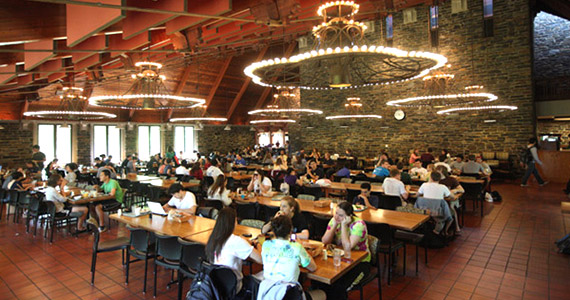
A group of friends on my hall convinced me to join them in the special kitchen at Sharples designated for students cooking up "served meal" on Friday nights. For those of us attending Swarthmore in the '80s, that was when the "small dining room" (usual home to the rocket scientists who otherwise populated the drab labs of duPont) was converted into a small student-run restaurant – complete with wait service. From planning the menu and creating the shopping list to cooking and serving a casually elegant meal (tablecloths, candlelight), my group of friends pulled off a virtual culinary masterstroke. I was hooked. It wasn't the restaurant business that called to me after that, but I had discovered the perfect date-night venue and I became a served meal frequent flier. It was absolutely backwards but perfectly Swarthmore – hands-on hard stuff first; epiphany later. Rikki Abzug '86
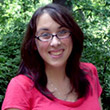 Because of Swarthmore, I celebrate the things I love as always worthy of closer investigation and analysis. Before Swarthmore, I might have instead dismissed such things. I'm able to take several steps back and examine those things - and topics that are totally new to me - thoughtfully and from multiple perspectives. Because of Swarthmore, I can make a mean panini and help make even meaner Shakespeare company, thanks to Sharples' salad bar and Drama Board (respectively)! If I found something missing, I then found people who challenged my opinions and encouraged me to take action. Because of Swarthmore, I was able to take on things I'd never even entertained as possibilities beforehand, and now any opportunity can become a valid dream. Holly Kinnamont '12
Because of Swarthmore, I celebrate the things I love as always worthy of closer investigation and analysis. Before Swarthmore, I might have instead dismissed such things. I'm able to take several steps back and examine those things - and topics that are totally new to me - thoughtfully and from multiple perspectives. Because of Swarthmore, I can make a mean panini and help make even meaner Shakespeare company, thanks to Sharples' salad bar and Drama Board (respectively)! If I found something missing, I then found people who challenged my opinions and encouraged me to take action. Because of Swarthmore, I was able to take on things I'd never even entertained as possibilities beforehand, and now any opportunity can become a valid dream. Holly Kinnamont '12
 I found my voice at Swarthmore. It was an empowering place to grow, connect, and discover who I was and what I cared about it. It became a place where I could forge new paths and carve new spaces to be myself. I became part of a community that fed me intellectually, politically, and emotionally. It was not always a utopia of learning and growing, but in grappling with those imperfections and limitations of the institution, I learned how to amplify my voice. I learned how to work alongside others in community, foster dialogue, and imagine a better campus... and ultimately, a better world. In helping me find my voice, Swarthmore gave me a courage that continues to ground me and move me forward. Nicole Nfonoyim-Hara '08
I found my voice at Swarthmore. It was an empowering place to grow, connect, and discover who I was and what I cared about it. It became a place where I could forge new paths and carve new spaces to be myself. I became part of a community that fed me intellectually, politically, and emotionally. It was not always a utopia of learning and growing, but in grappling with those imperfections and limitations of the institution, I learned how to amplify my voice. I learned how to work alongside others in community, foster dialogue, and imagine a better campus... and ultimately, a better world. In helping me find my voice, Swarthmore gave me a courage that continues to ground me and move me forward. Nicole Nfonoyim-Hara '08
 During my senior spring, Thursday afternoons were my favorite day of the week. I had Professor Allen Schneider's physiological psychology seminar with golf practice directly afterwards. To be able to discuss the underlying causes of Alzheimer's disease and then transition to making birdies on the golf course at Rolling Green perfectly captured my life as a student-athlete. My time at Swarthmore was so special because I had such a well-rounded experience in the classroom, on the golf course, and beyond. Kyle Krainock '13
During my senior spring, Thursday afternoons were my favorite day of the week. I had Professor Allen Schneider's physiological psychology seminar with golf practice directly afterwards. To be able to discuss the underlying causes of Alzheimer's disease and then transition to making birdies on the golf course at Rolling Green perfectly captured my life as a student-athlete. My time at Swarthmore was so special because I had such a well-rounded experience in the classroom, on the golf course, and beyond. Kyle Krainock '13
 The college that I have helped establish in Ghana, Ashesi University College, is an attempt to create an institution like Swarthmore College in Africa. We face enormous challenges on a continent that has too few such institutions. Yet, we persevere with the knowledge that our success will make a tremendous impact on the lives of many future generations in Africa and the world. Patrick Awuah '89
The college that I have helped establish in Ghana, Ashesi University College, is an attempt to create an institution like Swarthmore College in Africa. We face enormous challenges on a continent that has too few such institutions. Yet, we persevere with the knowledge that our success will make a tremendous impact on the lives of many future generations in Africa and the world. Patrick Awuah '89
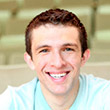 I left Swarthmore with a profound appreciation for perspective. Except, perhaps, within the axiomatic frameworks to which I tried to confine myself (math, music, economic theory), there is so much darn room for really reasonable and passionate people to disagree. Even after studying and learning a lot (my friends and I learned a lot at Swarthmore), we don't individually have all the answers. That's why I'm so thrilled (I tear up a little as I write this) to have so many interesting friends accomplishing insanely awesome things with whom I can grab a drink and keep learning. Soren Larson '11
I left Swarthmore with a profound appreciation for perspective. Except, perhaps, within the axiomatic frameworks to which I tried to confine myself (math, music, economic theory), there is so much darn room for really reasonable and passionate people to disagree. Even after studying and learning a lot (my friends and I learned a lot at Swarthmore), we don't individually have all the answers. That's why I'm so thrilled (I tear up a little as I write this) to have so many interesting friends accomplishing insanely awesome things with whom I can grab a drink and keep learning. Soren Larson '11
Swarthmore opened my mind and my world. Gospazha Shatagina was living history with stories of her life as the daughter of a diplomat in Tsar Nicolas' court. My fellow Russian students - like Cathy Agnelli '75, Karen Kohlberg '74, and Patty Winpenny '74 - were a hardy bunch who studied the language at 8 a.m. daily for years and earnestly debated crime and punishment, nationalism, and econ (sometimes in seminars that lasted longer than the Russian novels being discussed). Tom Bradley, an activist socialist intellectual, and Iurii Krugovoy, whose life and political experience were wildly different from Bradley's, brilliantly challenged us to think critically. Swarthmore gave me lifelong friends with whom I can start right up where we left off and it opened a world of alumni who accept me just because we share the life-enriching Swarthmore experience. Margaret Merrill Latshaw '74
Given the similar hoops we all had to dive through to become Swarthmore students, it is not surprising that we come to form a certain coterie that defies distance and time. Perhaps it is best expressed by Kurt Vonnegut in his novel Cat's Cradle. Members of his invented religion form groups called karass: "a group of people linked in a cosmically significant manner, even when superficial linkages are not evident." And their motto is "busy, busy, busy." When we rendezvous periodically, even with those we thought were in some alien camp, we quickly discover a common parlance, a love of intellectual autopsies, and a desire to nudge the dominoes of the status quo. Those of us with unions hatched in the matchbox share minds that continue to unravel mysteries over decades. Chris King '68
Swarthmore is my anchor and my frame of reference for excellence in teaching, and for principled, "in the moment" living. Swarthmore gave me my best friends and introduced me to my career. Anne Le Brun '97
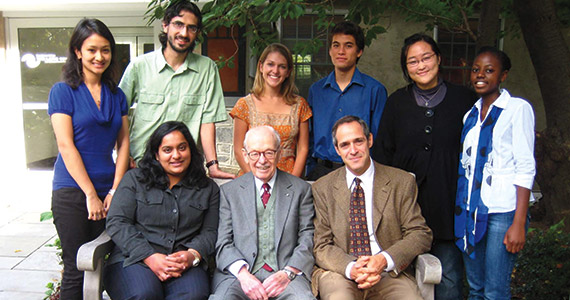
Throughout my life, Swarthmore has been my lodestar. I find that, by and large, Swarthmore has been remarkably constructive in considering ideas. It has always been conscious of the fact that it could be better. Swarthmore is an extraordinary place for its willingness, I think, to tolerate change. I've always enjoyed taking a position of advocacy for Swarthmore because it really meant a lot to me. I was very proud to be a Swarthmore student, perhaps because I always really wanted to be different. I didn't want to be like everybody else. Eugene Lang '38
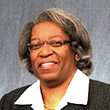 My Swarthmore experience has fueled a continuing desire to develop my own talents and abilities, a passion for reaching deep within to give my very best, and the courage to face new challenges with a strong belief in myself and my possibilities. Wilma Lewis '78
My Swarthmore experience has fueled a continuing desire to develop my own talents and abilities, a passion for reaching deep within to give my very best, and the courage to face new challenges with a strong belief in myself and my possibilities. Wilma Lewis '78
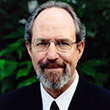 I had several great teachers at Swarthmore, and their lessons have been invaluable. From them, I learned how to ask a question and to question authority. I learned how to present and respect a good argument. I learned to speak up when confronted by injustice and unfairness. I learned the excitement that can come from learning and the educational value of a good story. And I learned the importance of a kind word passed from teacher to student. Bennett Lorber '64
I had several great teachers at Swarthmore, and their lessons have been invaluable. From them, I learned how to ask a question and to question authority. I learned how to present and respect a good argument. I learned to speak up when confronted by injustice and unfairness. I learned the excitement that can come from learning and the educational value of a good story. And I learned the importance of a kind word passed from teacher to student. Bennett Lorber '64
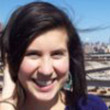 For me, the meaning of Swarthmore isn't found within the physical structures of the College itself, but rather exemplified by the individuals who are part of the Swarthmore community. As I meet Swatties around the world, I am struck by the common traits that emerge, such as quirkiness, tolerance, intellectual curiosity, and creativity. When I met a group of retired alumni traveling through Kenya and Tanzania, I was tickled (but not surprised) that some of them had taken the time to learn Kiswahili in advance of their two-week trip. When I reach out to alumni for career or life advice, often to people that I've never met, I am floored by the care, attention, and insightful nature of what I receive in return. I am grateful to be part of such a diverse and wonderful community. Martha Marrazza '09
For me, the meaning of Swarthmore isn't found within the physical structures of the College itself, but rather exemplified by the individuals who are part of the Swarthmore community. As I meet Swatties around the world, I am struck by the common traits that emerge, such as quirkiness, tolerance, intellectual curiosity, and creativity. When I met a group of retired alumni traveling through Kenya and Tanzania, I was tickled (but not surprised) that some of them had taken the time to learn Kiswahili in advance of their two-week trip. When I reach out to alumni for career or life advice, often to people that I've never met, I am floored by the care, attention, and insightful nature of what I receive in return. I am grateful to be part of such a diverse and wonderful community. Martha Marrazza '09
For me, the unique aspects of Swarthmore are its combination of liberal intellectuality, concerns about all kinds of people, and the pursuit of justice in the Quaker tradition. There were times when I spent an hour in the silence of the Quaker meeting on campus on Sundays. I was impressed with the Quakers' pacifist beliefs and actions, including declaring themselves conscientious objectors during the period of conscription for military service. I was left with a deep respect for Quakerism. Ken Matsumoto '58
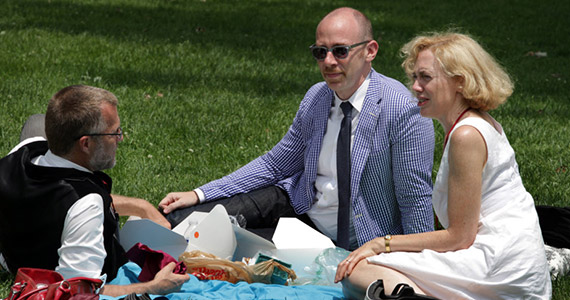
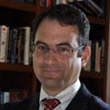 From Swarthmore, I developed a deep love of learning, which pervaded the environment. But even more importantly, I was empowered as a citizen and a leader. Philip Weiser '90
From Swarthmore, I developed a deep love of learning, which pervaded the environment. But even more importantly, I was empowered as a citizen and a leader. Philip Weiser '90
In terms of breadth and diversity of talents, the people I went to Swarthmore with are the most extraordinary group I've ever been a part of. Maybe most impressive was that people took issues and ideas seriously but never themselves. The qualities I learned from my Swarthmore experience were humility, balance, honesty, and a sense of humor. To his day, they have served me incredibly well. David McElhinny '75
The most valuable part of my education at Swarthmore was the availability of professors when I had problems getting adjusted to my first and part of my second year at Swarthmore. At that time, I had thought of transferring to other colleges where my workload would be easier, which would make me better able to concentrate on my courses. Most of my professors were a big help in convincing me that I shouldn't transfer, even though my grades were below B. They helped restore confidence in my ability to absorb the material and to write more coherently. Stanley Mills '53
For me, Swarthmore was all about learning to ask my questions with the full force of my life, through the relationships with professors that energized and encouraged me, formally in the classroom, for sure, but more so out on the lawn, in the halls, in their homes. Whatever I learned and forgot from their courses, all these years later, Don Swearer, Lee Devin, Richie Schuldenfrei, Hans Oberdiek, Bob Bannister, Phil Weinstein, Brendan Kennelly, Sue Snyder, and so many others, you are with me still. Connie Moffit '75
Our class of '68 arrived just after Swarthmore achieved its first 100 years. We were immediately captured by a host of political events and societal changes that made our Swarthmore years both an adventure and a trial. The life I had expected to lead was completely transformed at Swarthmore. Both those years and the people I shared them with continue to determine who I am socially, politically, intellectually, and morally. I learned how to think deeply and investigate rigorously at Swarthmore. I was tested by and tested others through endless, ardent debate that spilled from the classroom to the coffee shop, out to the streets, and back again. Today, through Lifelong Learning at Swarthmore, I re-experience this vortex of impassioned discussion many weeks a year. You never tire of a good thing and Swarthmore's gifts are good for a lifetime. Bob Mueller '68
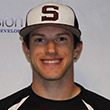 Why Swarthmore? We all had to answer this before coming to Swat, and while I had some pretty good reasons as I filled out my application, I can answer the question better now that I've graduated. There were plenty of reasons to apply: strong academics, small classes, beautiful campus, etc. While all of that is great, what truly made my experience so special were the lasting relationships I created with people all over campus. I formed lifelong friendships with baseball teammates, my DU brothers, and other classmates; worked with exceptional professors who not only taught me but took the time to provide much needed guidance throughout my academic career; and developed lasting friendships with members of the staff like my coaches and Mark and Jared in the Sports Information Office. All these relationships made my time at Swarthmore special and showed me why Swarthmore was truly the place for me. Tim Kwlios '13
Why Swarthmore? We all had to answer this before coming to Swat, and while I had some pretty good reasons as I filled out my application, I can answer the question better now that I've graduated. There were plenty of reasons to apply: strong academics, small classes, beautiful campus, etc. While all of that is great, what truly made my experience so special were the lasting relationships I created with people all over campus. I formed lifelong friendships with baseball teammates, my DU brothers, and other classmates; worked with exceptional professors who not only taught me but took the time to provide much needed guidance throughout my academic career; and developed lasting friendships with members of the staff like my coaches and Mark and Jared in the Sports Information Office. All these relationships made my time at Swarthmore special and showed me why Swarthmore was truly the place for me. Tim Kwlios '13
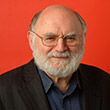 Maybe another way to say it is that there is the bottom line, and there is the party line. But at Swarthmore, there were no lines, unless one counts the Media-Wawa local line. Instead, Swarthmore did its best to imbue us with a critical spirit that questioned all lines, as it encouraged us to seek the good, the true, and the beautiful; to speak truth to power; to put human values above financial ones. Victor Navasky '54
Maybe another way to say it is that there is the bottom line, and there is the party line. But at Swarthmore, there were no lines, unless one counts the Media-Wawa local line. Instead, Swarthmore did its best to imbue us with a critical spirit that questioned all lines, as it encouraged us to seek the good, the true, and the beautiful; to speak truth to power; to put human values above financial ones. Victor Navasky '54
Swarthmore prepared me to think critically about and, much more importantly, to act critically at my jobs as a special education teacher and administrator. But Swarthmore prepared me best for my current, most awesome and challenging job yet, as a stay-at-home parent of two spunky little boys. Right now, it's all diaper changes and stroller maneuvering, but in a few years I will begin teaching these little guys to notice, think analytically about, and rage against the injustices we encounter in our everyday lives. Racism, classism, ableism, sexism, trans-/homophobia: the inequities that shape our world will die out all the more quickly if parents like me teach our kids to step up and say no. Swarthmore caught me when I was 18 and gave me power to help create a new generation of empowered, activist men who see their privilege and act as radical allies with others of their generation. Krys Belc (McIlraith) '09
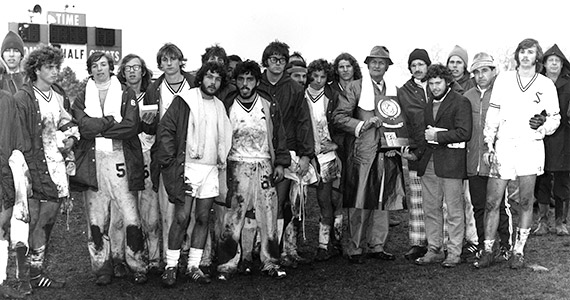
Playing four years of varsity soccer at Swarthmore! I tried hard NOT to follow the footsteps of my three older Swarthmore siblings, but that did not work. And for that I am thrilled. I arrived in late August to Willets room 218. My roommate and seven or eight other freshmen were invited to pre-season soccer. At the end of this stretch of two-a-day practices, meals, and playing pool at Tarble, it felt like I had known these guys forever. Soccer was just a fall season experience then, but it shaped my days, lifted my spirit, and focused me academically. Whether we were traveling to or hosting Princeton or Navy, or playing some school called Haverford, we were fierce competitors who never wanted to lose. We were very good. We had fun, we joked, and we got on each other's cases when we needed to. I loved it. Steven Schall '80
 Swarthmore was an expansion of my worldview. I grew up near Philly, just a half-hour drive away, but the people I met at Swarthmore, from all different walks of life and with different passions and interests, introduced me to the world outside my suburban bubble. Because of Swarthmore's inclusive study abroad and financial aid policies, I was able to spend half my junior year in Europe. My classes in history, women's studies, psychology, and sociology/anthropology taught me to understand my own experience – and my surroundings – with a critical lens. My mom was the first in our family to graduate from college and, because of the preparation I received at Swarthmore, I became the first in our family to earn a graduate degree. Swarthmore gave me access to opportunities I never would have expected. I can't imagine where I'd be today without the education I received here. Lee Paczulla '05
Swarthmore was an expansion of my worldview. I grew up near Philly, just a half-hour drive away, but the people I met at Swarthmore, from all different walks of life and with different passions and interests, introduced me to the world outside my suburban bubble. Because of Swarthmore's inclusive study abroad and financial aid policies, I was able to spend half my junior year in Europe. My classes in history, women's studies, psychology, and sociology/anthropology taught me to understand my own experience – and my surroundings – with a critical lens. My mom was the first in our family to graduate from college and, because of the preparation I received at Swarthmore, I became the first in our family to earn a graduate degree. Swarthmore gave me access to opportunities I never would have expected. I can't imagine where I'd be today without the education I received here. Lee Paczulla '05
 What attracted me to Swarthmore was the feeling that I would be an individual, entitled to personal attention, that I would be taught by professors, not graduate students, and that I would get a complete introduction to physics. I liked the idea of being on a beautiful campus, not in the middle of a city, and that even though I would be a scientist, I would be surrounded by people with many other interests. It was all true! John Mather '68
What attracted me to Swarthmore was the feeling that I would be an individual, entitled to personal attention, that I would be taught by professors, not graduate students, and that I would get a complete introduction to physics. I liked the idea of being on a beautiful campus, not in the middle of a city, and that even though I would be a scientist, I would be surrounded by people with many other interests. It was all true! John Mather '68
I applied to Swarthmore for perhaps an unusual reason. It was the mid-'50s, the height of the Cold War, when bomb shelters and civil defense drills were everywhere. In this atmosphere, my high school sent me to a Quaker conference on unilateral disarmament, a policy that seemed Polyannaish at best, especially to a refugee from Communism like me. Nonetheless, the presenters made such a compelling case that I decided immediately to seek out a Quaker college. Swarthmore accepted me and did not disappoint me. Its academic standards were among the highest in the world and students graduated extraordinarily well prepared. Equally important, however, was that it also challenged the consciences of its students through its thoughtful emphasis on questions of social and economic equity, conflict, the place of creativity and beauty in the world, and many others. Attending to such questions shaped my life at Swarthmore, and still does. Johnny Palka '60
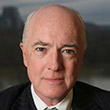 My mental frame was as if you could think and think and think and eventually hit a wall where the insights stopped. Then, against any reasonable expectation, Swarthmore would demand you think farther. And suddenly, you discover that terminal wall in that is porous. It's like a gauze curtain. And, thinking harder, you cross over — or through — and find a whole new space of original ideas. Surely, most students crossed over more easily than I. But those moments where I did cross, where I found for myself some original idea, were transporting. They were foundational to the two companies my wife and I built, and central to the privilege I've felt in owning The Atlantic. David Bradley '75
My mental frame was as if you could think and think and think and eventually hit a wall where the insights stopped. Then, against any reasonable expectation, Swarthmore would demand you think farther. And suddenly, you discover that terminal wall in that is porous. It's like a gauze curtain. And, thinking harder, you cross over — or through — and find a whole new space of original ideas. Surely, most students crossed over more easily than I. But those moments where I did cross, where I found for myself some original idea, were transporting. They were foundational to the two companies my wife and I built, and central to the privilege I've felt in owning The Atlantic. David Bradley '75